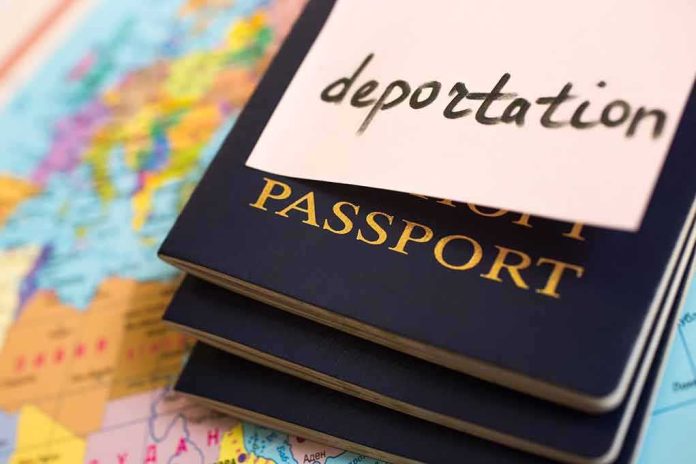
In a dramatic turn that underscores the Trump administration’s crackdown on illegal immigration and high-profile crime, the U.S. deported boxer Julio César Chávez Jr. to Mexico amid allegations of cartel ties and drug trafficking—fueling both public concern and debate about border security and celebrity privilege.
Story Snapshot
- Julio César Chávez Jr., son of a boxing legend, was deported to Mexico after his U.S. arrest for immigration violations.
- Chávez Jr. faces charges in Mexico for alleged arms and drug trafficking and suspected links to the Sinaloa Cartel.
- The case is a high-profile test of Trump’s tough new immigration enforcement policies and international law enforcement cooperation.
- Ongoing legal proceedings highlight the intersection of celebrity, organized crime, and strict border policy under the current administration.
Trump Administration’s Immigration Crackdown and Policy Context
Since returning to office in January 2025, President Trump has moved swiftly to fulfill campaign promises targeting illegal immigration and perceived abuses of the system. Executive orders declared a national emergency at the southern border, toughened enforcement, and classified international cartels as terrorist organizations. New laws like the Laken Riley Act mandate detention of immigrants charged with serious crimes, and deportations have risen dramatically. These actions signal a zero-tolerance approach—especially for individuals tied to criminal enterprises or public disorder.
The administration’s aggressive policies have led to a steep drop in illegal border crossings, the lowest in decades. Rapid expansion of expedited removals, daily arrest quotas, and the use of local police as immigration enforcement partners reflect a systematic effort to deter illegal entry and penalize offenders. Sanctuary jurisdictions face threats of funding cuts and civil penalties unless they cooperate fully with federal authorities, further tightening the net around unauthorized residents. For high-profile individuals like Chávez Jr., these changes eliminated potential loopholes and expedited removal processes.
The Chávez Jr. Case: Timeline and Legal Proceedings
Julio César Chávez Jr., the son of Mexico’s most celebrated boxer, rose to fame in the early 2010s but soon became embroiled in a series of legal and substance abuse issues. U.S. and Mexican authorities began investigating him for alleged cartel ties as early as 2019. After a high-profile boxing defeat to Jake Paul in July 2025, Chávez Jr. was arrested by U.S. Immigration and Customs Enforcement outside his California home for overstaying his visa and making fraudulent statements on his green card application. He was deported to Mexico in August 2025 and now faces serious criminal charges, including arms and drug trafficking, under the scrutiny of Mexican federal authorities.
The case underscores how sports celebrity does not protect individuals from the consequences of illegal activity or immigration violations under the Trump administration. Chávez Jr.’s deportation and immediate handover to Mexican authorities demonstrate the administration’s resolve to remove those suspected of criminal ties, regardless of status or notoriety. Mexican President Claudia Sheinbaum and Attorney General Alejandro Gertz Manero have publicly supported the prosecution, reflecting the high-profile nature and diplomatic cooperation involved.
Broader Implications: Law Enforcement, Border Security, and Public Response
This high-profile deportation highlights the Trump administration’s focus on restoring border integrity and holding all violators accountable, regardless of fame. The case is a strong message: celebrity status offers no immunity from enforcement when national security and public safety are at stake. It also demonstrates close collaboration between U.S. and Mexican authorities, setting a precedent for future cases involving organized crime and illegal immigration.
For American conservatives, the Chávez Jr. saga affirms the necessity of strong borders and strict immigration enforcement to protect national interests and uphold the rule of law. The administration’s actions align with long-standing calls to end policies perceived as lenient or “woke,” and to prioritize American security over celebrity privilege or foreign influence. However, the case also raises questions about due process and the ongoing challenges of combating cartel influence on both sides of the border. The lack of publicly released evidence regarding cartel ties reminds observers that legal outcomes must be grounded in transparent, credible proceedings.
While the case has deeply affected the Chávez family and the boxing world, it is a signal to all: the current administration’s approach leaves little room for compromise on illegal immigration, organized crime, or the abuse of American laws. The outcome may set new standards for law enforcement cooperation and the treatment of high-profile offenders in an era of heightened national vigilance.
Sources:
ESPN: Boxer Julio César Chávez Jr. deported to Mexico for alleged cartel ties
Los Angeles Times: Boxer Julio César Chávez Jr. deported to Mexico
CBS News: Julio César Chávez Jr. deported to Mexico for alleged cartel, drug trafficking allegations







